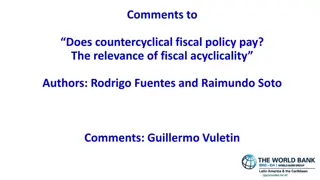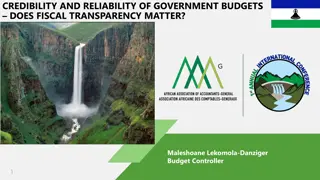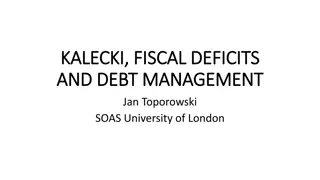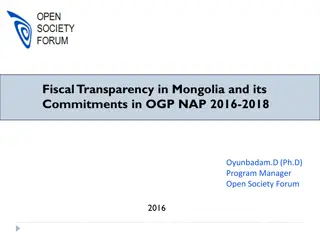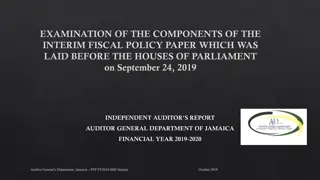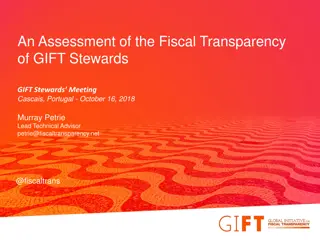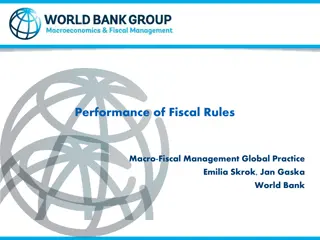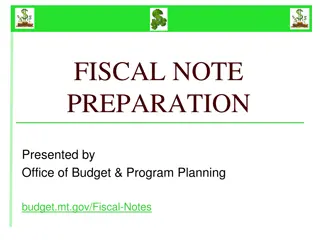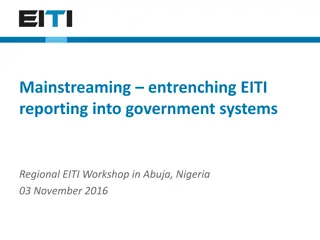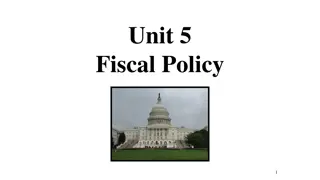Importance of Fiscal Transparency for Governance
Fiscal transparency, characterized by clear, reliable reporting of public finances, is crucial for holding governments accountable and preventing misuse of public funds. Lack of transparency can lead to corruption and undermine governance. The IMF provides tools like the Fiscal Transparency Code to identify vulnerabilities and reform priorities.
Download Presentation

Please find below an Image/Link to download the presentation.
The content on the website is provided AS IS for your information and personal use only. It may not be sold, licensed, or shared on other websites without obtaining consent from the author.If you encounter any issues during the download, it is possible that the publisher has removed the file from their server.
You are allowed to download the files provided on this website for personal or commercial use, subject to the condition that they are used lawfully. All files are the property of their respective owners.
The content on the website is provided AS IS for your information and personal use only. It may not be sold, licensed, or shared on other websites without obtaining consent from the author.
E N D
Presentation Transcript
What is fiscal transparency and why it matters for governance? o Fiscal Transparency can be defined as: Clear, reliable, relevant and timely reporting of the state of public finances and openness to the public of the government s fiscal policy- making process. Fiscal transparency is important as it is about the use of public funds. Fiscal transparency provides legislatures, markets, and citizens with the information they need to hold governments accountable for their fiscal performance and use of public resources. A lack of fiscal transparency can undermine accountability and provide opportunities for the misappropriation of public funds.
IMF tools help identify governance/corruption vulnerabilities and reform priorities o IMF s Fiscal Transparency Code (Globally recognized standard in this area) o Fiscal Transparency Evaluations (FTEs) are the IMF s fiscal transparency diagnostic o 2018 Fiscal Transparency Handbook (explains the Code with country examples) o IMF s Governance Diagnostic Assessments
IMF Fiscal Transparency Code (Internationally recognized standard) Integrated Four Pillars of the IMF Code I. FISCAL REPORTING II. FISCAL FORECASTING & BUDGETING III. FISCAL RISK ANALYSIS & MANAGEMENT IV. RESOURCE REVENUE MANAGEMENT 4.1. Resource Ownership and Rights 1.1. Coverage 2.1. Comprehen- siveness 3.1. Risk Analysis & Disclosure 4.2 Resource Revenue Mobilization 1.2. Frequency and Timeliness 2.2. Orderliness 3.2. Risk Management 4.3. Resource Revenue Utilization 2.3. Policy Orientation 3.3. Fiscal Coordination 1.3. Quality 4.4. Resource Activity Disclosure 2.4. Credibility 1.4. Integrity 4
Overall Findings from FTEs undertaken so far FTE Results by Pillar (Percent of total scores) FTE Results by Country Grouping (Percent of total scores) 5
Fiscal transparency gaps exacerbate governance and corruption vulnerabilities Serious undertlying institutional vulnerabilities to corruption A. Incomplete coverage of fiscal reports (do not reflect some activities of government entities) B. Financial records not reliable (e.g., no bank reconciliation of treasury accounts) C. Absence of independent and timely audit of government financial statements D. Off-budget fiscal activities/decisions (decisions taken outside the budget process) E. Investment projects not subject to open and competitive tender F. Fiscal implications of government guarantees not identified and disclosed G. Public Corporations risks not identified and disclosed 6 Source: IMF staff estimates and World Bank Data Governance Indicators
Improving Fiscal Transparency will Help Reduce Corruption 7
IMFs Governance Diagnostics - Some Country Examples IMF s Governance Diagnostics focus on: Fiscal governance, rule of law, anti-Corruption and anti-money laundering frameworks, market regulation, financial supervision, central bank governance and public procurement. Country examples Guinea-Bissau Mozambique Zimbabwe 8
Thank You! IMF Fiscal Transparency Web Page http://www.imf.org/external/np/fad/trans/i ndex.htm Fiscal Transparency Handbook www.elibrary.imf.org/fth 9


